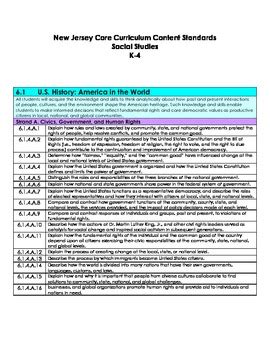Social studies education plays a crucial role in shaping future citizens by fostering critical thinking, historical understanding, and civic engagement. The New Jersey Department of Education has established comprehensive social studies standards to guide educators in preparing students for active participation in a democratic society.

Core Components of Social Studies Standards
The New Jersey Social Studies Standards encompass the following key components:
- Geography: Students explore the physical and human characteristics of Earth’s regions, including their cultural, economic, and political landscapes.
- History: Students delve into the past to understand the origins and development of human societies, civilizations, and nations.
- Economics: Students analyze economic systems, principles, and decision-making, developing an understanding of how resources are allocated and how markets function.
- Civics and Government: Students investigate the principles of democracy, the roles of government, and the rights and responsibilities of citizens.
- Social Studies Skills: Students develop research, analysis, communication, and problem-solving skills essential for navigating the challenges of a globalized society.
Benefits of Adhering to Social Studies Standards
Implementing the New Jersey Social Studies Standards offers numerous benefits for students:
- Enhanced Civic Literacy: Students gain a deep understanding of civic values, historical events, and government structures, empowering them to become informed citizens.
- Historical Perspective: Students develop an appreciation for the past and its influence on the present, enabling them to make informed decisions about the future.
- Critical Thinking and Analysis: Students learn to evaluate sources, identify bias, and form reasoned arguments, developing the cognitive skills necessary for success in any field.
- Cultural Awareness: Students explore diverse perspectives and cultures, fostering empathy, tolerance, and global understanding.
- Effective Communication: Students develop strong writing and speaking skills through research projects, presentations, and debates, preparing them for effective participation in society.
Strategies for Effective Implementation
To effectively implement the Social Studies Standards, educators can employ the following strategies:
- Incorporate Primary Sources: Use historical documents, speeches, and artifacts to engage students with authentic materials.
- Foster Collaboration: Encourage students to work together on projects and discussions, promoting teamwork and diverse perspectives.
- Utilize Technology: Integrate interactive simulations, online resources, and digital tools to enhance student engagement and learning.
- Differentiate Instruction: Tailor instruction to meet the needs of all learners by providing differentiated materials and activities.
- Assess Student Understanding: Regularly assess student progress through formative and summative assessments to provide timely feedback and guide instruction.
Common Mistakes to Avoid
While implementing the Social Studies Standards, educators should avoid the following common mistakes:
- Overemphasizing Content: Focusing solely on covering the curriculum without allowing students to develop higher-order thinking skills.
- Neglecting Skill Development: Failing to prioritize the development of research, analysis, and communication skills.
- Teaching History in Isolation: Presenting historical events without connecting them to present-day issues and student experiences.
- Ignoring Diversity: Overlooking the importance of representing various perspectives and cultures in the curriculum.
- Failing to Address Current Events: Neglecting to engage students with contemporary issues that impact society and the world.
Pros and Cons of Social Studies Standards
Pros:
- Provide a clear framework for teaching and learning social studies
- Promote civic literacy, critical thinking, and cultural awareness
- Aligned with state and national educational goals
Cons:
- Can be time-consuming to implement effectively
- Curriculum may not always align with student interests
- Can be challenging to assess student understanding accurately
Tables for Social Studies Standards in New Jersey
| Grade | Geography | History | Economics | Civics and Government |
|---|---|---|---|---|
| K-2 | Map skills, local geography, natural resources | Community history, personal narratives | Goods and services | Rules and responsibilities |
| 3-5 | World geography, cultural diversity, geographic regions | American history, historical figures | Economic systems, supply and demand | Principles of democracy, branches of government |
| 6-8 | Physical and human geography, global issues | World history, major civilizations | Market economy, financial literacy | US government, rights and responsibilities |
| 9-12 | Advanced geography, spatial analysis | Advanced history, global perspectives | Macroeconomics, microeconomics | Comparative government, political ideologies |
| Core Concept | Performance Expectations |
|---|---|
| Civic Identity and Responsibility | Students will analyze the rights and responsibilities of citizens in a democracy. |
| Historical Thinking and Skills | Students will use historical evidence to construct and analyze historical narratives. |
| Economic Systems and Decision-Making | Students will explain how economic systems allocate resources and influence decision-making. |
| Geographic Knowledge and Skills | Students will use maps and other geographic tools to analyze patterns and relationships in the natural and human worlds. |
| Inquiry and Research Skills | Students will use primary and secondary sources to conduct research and develop arguments. |
| Strategy | Benefits | Challenges |
|---|---|---|
| Project-Based Learning | Promotes active learning, student engagement, and collaboration. | Can be time-consuming to implement and assess. |
| Inquiry-Based Instruction | Encourages students to ask questions, explore ideas, and develop critical thinking skills. | Requires careful planning and facilitation. |
| Differentiated Instruction | Tailors instruction to individual student needs, promoting student success and equity. | Can be challenging to implement effectively in large classes. |
| Technology Integration | Enhances engagement, provides access to diverse resources, and supports student creativity. | Requires adequate technological infrastructure and teacher training. |
| Cooperative Learning | Fosters collaboration, communication, and peer support. | Can be challenging to manage effectively in diverse classrooms. |
